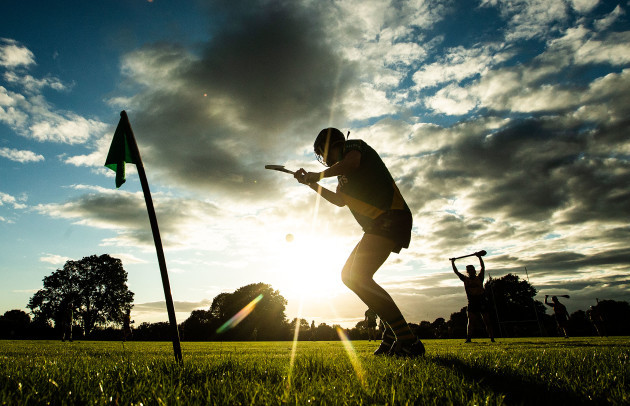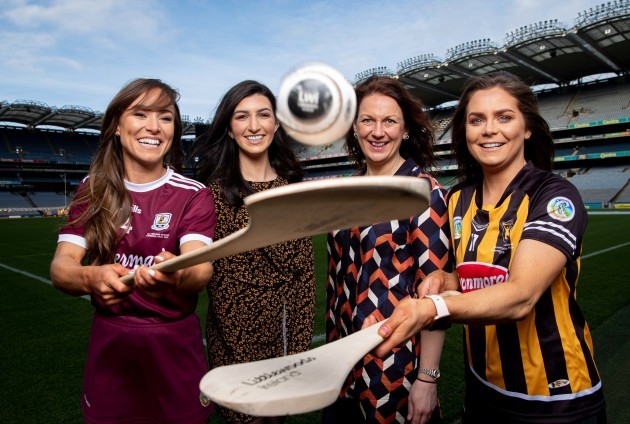“NOW, THE TIME is for us to work together,” says Camogie Association CEO Sinéad McNulty, stressing the importance of equality across the board.
While there have been several calls through the years for the Camogie Association, the Ladies Gaelic Football Association [LGFA] and the GAA to come under the one umbrella, McNulty is a firm believer in the Gaelic games family.
This sees the three governing bodies work together, but remain as separate entities.
The Camogie Association recently launched its National Development Plan 2020-23, with 12 key goals outlined in the four-year roadmap.
Goal 10 is, “To work collaboratively with the GAA and LGFA as part of the Gaelic Games family” with this partnership — and ‘the closest possible collaboration with the Gaelic Games family’ — mentioned several times throughout the document.
Goal 11 is, “To ensure appropriate playing facilities for Camogie”.
And when asked about the most important messages to push after the plan’s launch, Dubliner McNulty, who has been in the role of Ard Stiúrthóir for just over a year now, was keen to outline these two.
“Partnership is a big part of how we do what we do,” she told The42 during an in-depth interview last week.
We are a part of the Gaelic games family and that’s a really important connection, there’s really important links there. Jointly, camogie and hurling were recognised by UNESCO as heritage sports so that’s a really important part of it.
“Obviously, our facilities, we rely really heavily on our colleagues across the Gaelic games family and the GAA to allow our sports to be played on their facilities. We have to recognise that.
“But we need to also understand what facilities we need at national level when we need them to try and help alleviate the pressures that can come when a club is growing and they have multiple teams in multiple codes all wanting to play their games on a Saturday or a Sunday.
“That’s all around the audit of facilities and understanding what we need and when we need it so that we can be more informed and approach it in a more strategic and structured way around facilities — and see if we need to develop facilities in partnership with people around the country as well.”
Later, McNulty delved deeper into the Gaelic games family concept and the Association’s links with the LGFA and the GAA.
It’s worth pointing out that all Gaelic games messaging through the Covid-19 pandemic has come from the three organisations together, as they follow the same roadmap.
Double-headers have brought great success over the past few years, and McNulty feels this equal staging is important not only at inter-county level, but across the board.
It’s key for younger children in clubs across the country to feel that they’re given a uniform staging to their counterparts.
“It’s important the whole way up, the continuum,” she agrees. “At a national level, we’re working really closely and some of the stuff that we do together, you were only starting to see at the start of 2020.
“Our joint-foundation coaching programme, the leadership development programme, they’re all joint initiatives across the three associations. They’ve been a couple of years in the making but they’re really only starting to come to the fore and become public. It’s good to see our members seeing it.”
“At a club level, I know when you join Round Towers, you just join the club,” she continues with a nod to her own club in Clondalkin.
“You don’t necessary know — or you don’t need to know that there’s three separate associations. Sometimes it can just become a little bit complicated.
What we want is that every player in a club has equal status within the club. When their teams win, they’re celebrated the same regardless of whether they’re boys or girls, camogie, hurling or football. That kind of thing.
“Listen, we have 120 years of culture to change as well. There was a time when separatism in sport was so important, there was a whole philosophy around it and now, I think, the time is for us to work together.
“We will be, and we are better when we work together. We can achieve more, there’s more synergy and energy. You have males and females working together for the same cause, that’s going to bring dividends. But it’s not without its challenges.”
On that point, she recalls a message from a good friend when she landed the job as Camogie chief. His daughter is a camogie player and coach.
Right, can you sort out a couple of things for me? One: fixtures, two: skorts and three….
“She just had this list of things that she wanted to me to fix,” McNulty recalls, “and I’m like, ‘Okay, you can’t just fix those.’ Some of them we have to chip away at.”
While there are challenges, there has been significant progress made of late, she says.
“Listen, there’s so much fantastic work going on around the country. If you look at the likes of Waterford and Wexford and Roscommon over the years, they have been putting together joint fixture lists between Ladies Gaelic football and camogie.
“In Waterford, the home games are in Walsh Park. That’s all down to personal relationships down there.
What I would love to see is that our personal relationships, but also our professional ways of working together, make sure that that happens for all of our girls. That all of our inter-county teams get to play in the best and the most appropriate facilities for them, and that’s their county grounds or their county’s second grounds.
“As a national association, our ambition is that we’re able to plan better and being able to plan better means knowing well in advance where your games are going to be — and that’s hard.
“I mean, you can really see it this year, we’re trying to get a full inter-county season into an eight-week schedule. Bearing in mind that everyone’s trying to grow their game and get more people playing, and then you’re trying to limit the inter-county schedule into an eight-week period.
“There’s always going to be pressure there, there’s not enough of weekends for everyone.
“You’re in a situation where you’re going to need lights to be able to play the games, just in case. You need a particular level of facility to be playing inter-county and particularly then if you’re going from October to December in the time of year when it’s dark, and it’s wet and all of those things.”
“We do need to work together and we need to showcase the best practice, understand what the challenges are that people face and try and work it through together,” she concludes. “That would that would be my my approach to it.
“These things are always challenging. It’s loaves and fishes, you know, in some respects when you’re coming to weekends between October and December. It’s a challenge.”
But a challenge that will be faced head on.
The42 is on Instagram! Tap the button below on your phone to follow us!


